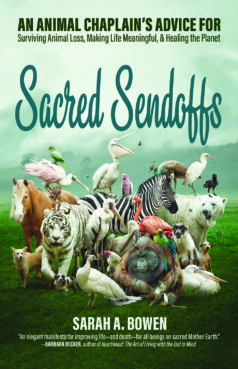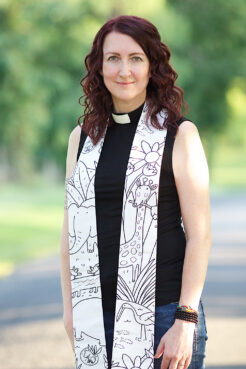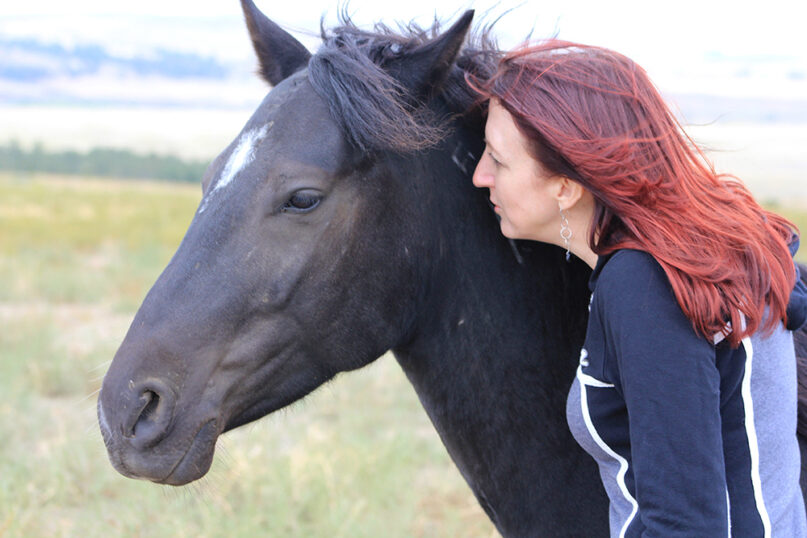VATICAN CITY (RNS) — Many’s the pet lover who chooses to be called “Mom” or “Dad” instead of master, or whose bumper sticker boasts of “four-footed grandchildren.” But when Pope Francis recently denounced the “selfishness” of choosing to care for an animal instead of adopting a child, animal lovers bridled, criticizing the pope’s “insensitive” comments on their choice to shower their love on other species.
“Many couples do not have children because they do not want to, or they have just one because they do not want any more, but they have two dogs, two cats. … Yes, dogs and cats take the place of children,” the pope said.
Among those who were puzzled by Francis’ remarks was the Rev. Sarah Bowen, an animal chaplain at the Compassion Consortium, an interfaith and interspecies religious organization based on “reviving lost connections between animals, humans and the earth.”
“I’m not sure that Pope Francis realized some of the implications of his statement at the time,” Bowen told Religion News Service. She said his comments go beyond cats and dogs to questions of bearing children in an overpopulated world and living full lives without children.
That, not Francis’ appeal to adopt, is what Bowen believes struck a nerve for people. The pope’s statement implied “that people who don’t have children and don’t experience fatherhood or motherhood don’t experience the fullness of life,” she said.
“The pope’s comments have a far-reaching impact for Catholics, as well as people who are curious about what the pope says who may not be part of the Catholic Church now but are interested in what does this mean for us culturally,” said Bowen, who estimates that some 57% of homes in the world include cats or dogs.

“Sacred Sendoffs” is a new book by the Rev. Sarah Bowen about finding meaning during loss, among other topics regarding faith and animals. Cover art courtesy of sacredsendoffs.com
As a clergyperson for Compassion Consortium, Bowen holds monthly online services in which she prays for animals who have lost their habitat or face extinction, and often prays and meditates with animals, who are always welcome onscreen. Recently, a special guest speaker, Bree the rooster, was the inspiration for a reflection on the impact of intensive farming on animals and the environment.
Part of Bowen’s ministry also addresses the pain and grief that follow the loss of an animal companion, at the heart of her new book, “Sacred Sendoffs.”
Bowen prefers the use of the term “animal companions,” rather than pets. She said she shares her home in the greater New York City area with three: her human husband, Shawn, and two felines. A “Christian preacher’s kid” raised in a house full of cats, she looks to the Bible for guidance about how to interact with animals. She cites Psalm 104 — “In wisdom you made them all; the earth is full of your creatures” — and Psalm 104 — “Let everything that has breath praise the Lord.”
But she said that she has taken inspiration from the pope’s own remarks on nature and the environment. “Because all creatures are connected, each must be cherished with love and respect, for all of us as living creatures are dependent on one another,” wrote Francis in his 2015 “green” encyclical, “Laudato Si’.”
The document is inspired by the pope’s namesake, Francis of Assisi, a saint known for his relationship with animals and who is often depicted surrounded by squirrels, donkeys, wolves and all manner of birds.
The animal chaplain saw the pope’s recent remarks as “a step backward” from his previous advocacy for the world’s diverse inhabitants and “typical of the tension that all humans feel about the entanglement between human and other-than-human needs and lives.”
RELATED: Vatican braces for 2022 deficit as donations drop in wake of financial scandal
Many popes have shown an affinity for their own animals, from Pope Pius II’s love for his dog in the 15th century to Pope Emeritus Benedict XVI’s proclivity for cats. At a general audience in May 1969, St. Paul VI said that even animals yearn “anxiously for the glorious manifestation of the children of God,” while St. John Paul II went as far as to state that animals too have a “vital whiff or breath that they have received from God.”

The Rev. Sarah A. Bowen is an animal chaplain who works with animals of all kinds, both wild and domestic, as well as their human companions. Photo courtesy of sacredsendoffs.com
Bowen is convinced that animals have a lot to teach humans about spirituality. Any cat owner can relate to seeing feline friends in an “utterly blissed out” state, she said. That complete relaxation is not unlike prayer, she said.
“There is very much the capacity for a lot of different types of species to be spiritual,” Bowen said, citing MRI studies that the same activity of the human brain observed during prayer, chanting or meditation is present in some animals.
Primatologist and anthropologist Jane Goodall has highlighted the deep emotional lives of chimpanzees and gorillas, affirming Bowen’s belief that animals too “have experiences of awe and wonder and what we humans would call spirituality.”
Francis could benefit from this evidence, Bowen said, and from studies that show that children raised in homes with animals have increased empathy, not to mention other studies that show that animals may relieve depression and anxiety while improving cardiovascular health and dementia. “I think he would be very interested to learn about these connections, and I would be curious how he responds to that within Catholic doctrine,” she said.
Whether or not these scientific data influence the pope’s views, Bowen said that his words didn’t properly represent Christian teaching. Francis seemed to imply, she said, that “love is a limited supply.”
In Bowen’s eyes, there is more than enough love to share with children, other people’s children and even pets.





